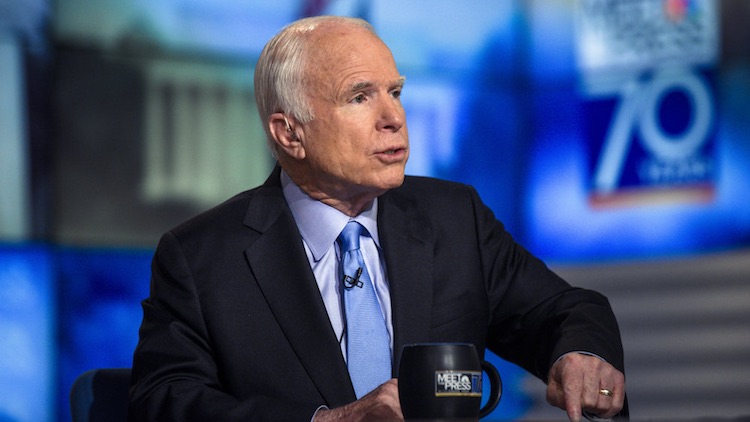Sen. McCain Has Brain Cancer

The smarter way to stay on top of broadcasting and cable industry. Sign up below
You are now subscribed
Your newsletter sign-up was successful
Sen. John McCain (R-Ariz.) has been diagnosed with a malignant brain tumor, which drew immediately expressions of concern and support from Washington.
According to a statement from the Mayo Clinic, the senator underwent a procedure to remove a blood clot above his left eye at a Mayo Clinic hospital in Phoenix when a primary brain tumor was discovered.
“The Senator and his family are reviewing further treatment options with his Mayo Clinic care team," said the hospital. "Treatment options may include a combination of chemotherapy and radiation."
McCain's office says his return to the Senate will depend on the outcome of "further consultations" with his doctors.
"Sen. John McCain is one of the greatest Americans who ever lived—Naval aviator, Vietnam War POW, military hero, U.S. Senator, GOP Presidential nominee. Sen. McCain is a public servant without peer and with unequaled devotion," said American Cable Association president Matt Polka. "All of us at ACA are praying that Sen. McCain stages a full and complete recovery from his bout with a brain tumor and soon returns to the Senate, where the country needs his voice and experience. ACA sends its prayers and best wishes to the McCain family."
President Donald Trump, who has had something of a rocky relationship with the senator, offered a show of support as well. "Senator John McCain has always been a fighter," he said in a statement. "Melania and I send our thoughts and prayers to Senator McCain, Cindy, and their entire family. Get well soon."
McCain, former chairman of the Senate Commerce Committee, which oversees communications, has long been active on media issues, earlier this year co-sponsoring a muni broadband bill.
The smarter way to stay on top of broadcasting and cable industry. Sign up below
He has also comes to the defense of media outlets under fire from Trump. In an interview on NBC's Meet the Press last February, McCain said: “If you want to preserve democracy as we know it, you have to have a free and, many times, adversarial press. And without it, I am afraid that we would lose so much of our individual liberties over time. That's how dictators get started."
"[W]hen you look at history, the first thing that dictators do is shut down the press,” he said. “And I'm not saying that President Trump is trying to be a dictator. I'm just saying we need to learn the lessons of history.”
Contributing editor John Eggerton has been an editor and/or writer on media regulation, legislation and policy for over four decades, including covering the FCC, FTC, Congress, the major media trade associations, and the federal courts. In addition to Multichannel News and Broadcasting + Cable, his work has appeared in Radio World, TV Technology, TV Fax, This Week in Consumer Electronics, Variety and the Encyclopedia Britannica.

